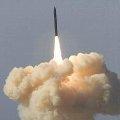Obama Replaces Bush's Missile Defense Plan
This is IN THE NEWS in VOA Special English.
In two thousand six, Defense Secretary Robert Gates advised President George W. Bush to base a missile defense system in Europe. Russia objected to what it saw as threat to its security. But supporters said it was the best way to protect the United States and its European allies from countries like Iran or North Korea.
The Bush administration proposed a radar base in the Czech Republic and ten interceptor missiles in Poland. These are missiles used to shoot down other missiles.
But now, President Barack Obama has announced his own plan. He says it is based on improved technologies and new intelligence about Iran. Officials say Iran has made slower progress than expected in developing long-range ballistic missiles.
Defense Secretary Gates says short- and medium-range missiles are now the more immediate threat to American forces in Europe and to allies. He says the United States will deploy radar sensors and interceptors in northern and southern Europe on ships. This would make it easier to move them if needed.
This first part is planned for two thousand eleven. A second part, about two thousand fifteen, will involve putting land-based systems in Europe. Secretary Gates said talks have begun with allies, starting with Poland and the Czech Republic.
President Obama announced his plan at the White House on Thursday.
BARACK OBAMA: "The best way to responsibly advance our security and the security of our allies is to deploy a missile defense system that best responds to the threats that we face and that utilizes technology that is both proven and cost effective." Czech Prime Minister Jan Fischer said the president informed him early Thursday, and that the Czech Republic "acknowledges this decision." Poland's Prime Minister Donald Tusk says his country still remains loyal to the United States. But Zbigniew Lewicki, a specialist in American studies at the University of Warsaw, expressed concerns. He spoke to the Polish Radio External Service.
ZBIGNIEW LEWICKI: "Nobody opposes better relations between the United States and Russia. But it should never be done in a manner which confirms Russia's unfounded claims to be the decisive force in this part of Europe." Russian President Dmitry Medvedev called the decision a "responsible move." He and President Obama are expected to meet next week. They will attend the United Nations General Assembly in New York and the Group of Twenty economic meeting in Pittsburgh, Pennsylvania.
The Obama administration has said it wants to "reset" relations with Russia. The two sides have been negotiating a new treaty to reduce nuclear arms, to replace a treaty that ends in December.
But the decision to drop the Bush missile-defense plan brought a mixed reaction in Congress. Members of the president's Democratic Party praised the move. But minority Republicans said it betrays two close allies in Europe and will empower Russia. Critics also noted Russia's efforts to block stronger measures against Iran over its disputed nuclear program. But Secretary Gates noted repeated delays in getting Czech and Polish approvals for the plan. He also reacted to the critics.
ROBERT GATES: "Those who say we are scrapping missile defense in Europe are either misinformed or misrepresenting the reality of what we are doing." And that's IN THE NEWS in VOA Special English, on radio and at voaspecialenglish.com. I'm Steve Ember.

